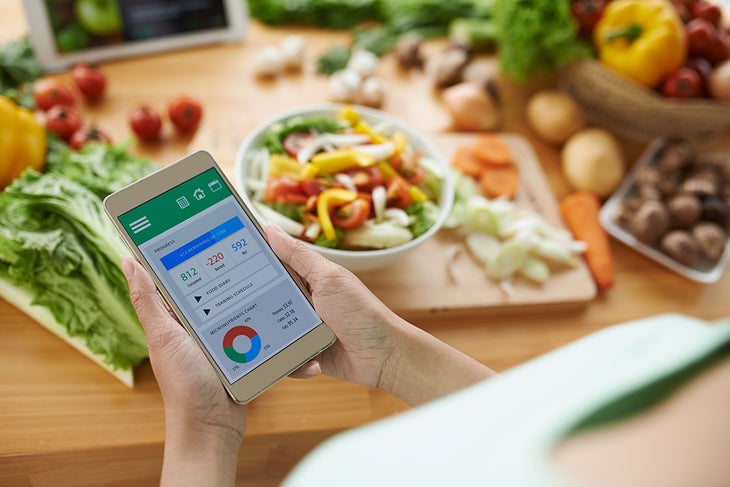Heading out the door? Read this article on the new Outside+ app available now on iOS devices for members! Download the app.

Q: How do I determine how many calories I really need?
A: Actually, you shouldn’t have to think about it, because your digestive tract does the counting for you. It has a complex set of nerves designed to give you a gnawing feeling in your stomach and scream, “Feed me!” when you need more food. These nerves signal you again when you’re full. Just as your lungs know when to breathe, your digestive tract knows when you need to eat. For the most part, the system works pretty well, which is why people eat nearly the same amount of calories each day, without counting. On average, American women consume roughly 2,000 calories each day, men about 2,500, although these numbers vary from person to person, depending on body size and activity.
Unfortunately, certain foods defeat this system. Chocolate, for example. We don’t eat chocolate because we are hungry; we eat it because we love the taste. It also triggers a release of opiates within the brain, causing a slight feel-good sensation. So even if you are completely stuffed after a wonderful dinner, you may still want a piece of chocolate. Ditto for sugar, cheese, and meat. They have very mild opiate effects, causing them to tempt us for reasons other than hunger, often leading us to overdo it.
Q: Should I cut calories if I am trying to lose weight?
A: To lose weight, you do have to eat fewer calories than you burn, but you don’t have to do it through willpower. If you change the type of food you eat, it happens more or less automatically. Here are three tricks you should know: First, bring on the high-fiber foods. Fiber holds water and tends to fill you up, tricking your stomach into thinking you’ve eaten more than you actually have. The fiber champions are beans, followed by vegetables, fruits, and whole grains.
Second, keep fats, including oils, to a bare minimum. Fats pack 9 calories into every gram (compared with only 4 calories for a gram of carbohydrate or protein). Steer clear of fatty foods, and you’ll tend to eat fewer calories.
Third, avoid sugar. Although it has nowhere near the calories that fats have, sugar is the “stealth” nutrient. It hides in all manner of foods and drinkssuch as the 150 calories worth of sugar lurking in a typical can of soda.
Q: Do my caloric needs change if I am more or less active?
A: Yes, but less than you’d think. Your brain, muscles, heart, liver, kidneys, and every other part of you are busily burning calories when you’re completely stilleven while you sleep. These basic functions account for 60 to 75 percent of all the calories you burn. You burn another 10 percent of your calories in the process of digesting foods. Routine physical activity accounts for only 15 to 30 percent of our daily calorie burn. So if you suddenly were flat on your back with a broken leg, your calorie needs would fall only slightly. And if you lace up your sneakers for a race, you do not need a lot of extra calories.
Skeptical? Go to the nearest gym, jump on a treadmill, and run flat out for a mile. Then push the little button that tells you how many calories you’ve burned. It turns out to be only about 100. Caloric intake for serious athletes is another matter. Olympic swimmer Michael Phelps works out five hours a day, six days a week. To keep up with his intense workout, he takes in thousands more calories each day than you or I would ever need.
Q: Does it matter when during the day I get my calories?
A: Yes, it does. People who skip breakfast and pack their calories into the later part of the day tend to weigh more than people who eat earlier in the day. Whether the issue is some sort of hormonal effect of late-night eating, or because late-night food choices tend to be especially fattening is not yet clear.
Q: Is my body’s metabolic rate genetic? Is there anything I can do to rev it up?
A: It is genetic, to a large extent. But, yes, you can rev it up, to a degree. First of all, the after-meal calorie burn that comes as you digest foods can be increased by a low-fat plant-based diet. The reason, apparently, is that such a diet causes the body to be more sensitive to insulin, which pushes nutrients into the cells where they can be burned. So, more of the calories you eat will be liberated as body heat, rather than stored as fat. Second, exercise. People who exercise vigorously tend to burn calories faster, not just while they are exercising, but afterward too, as their bodies repair stressed tissues.